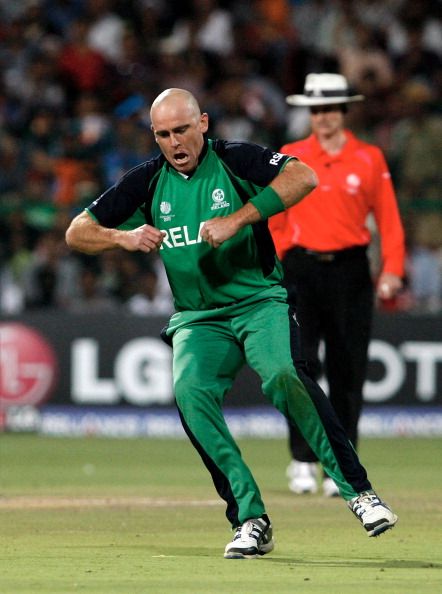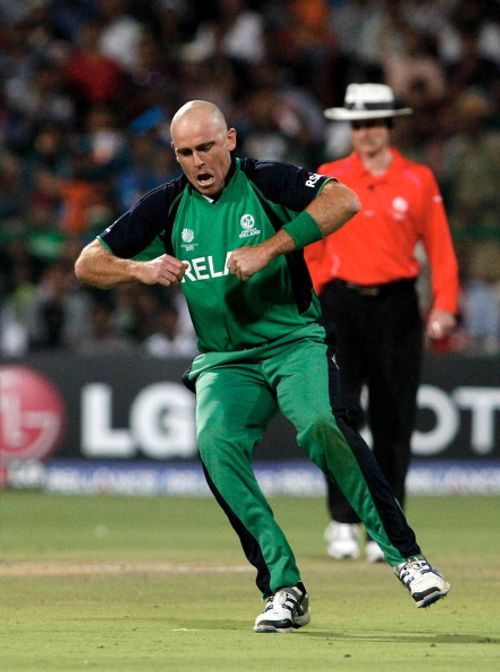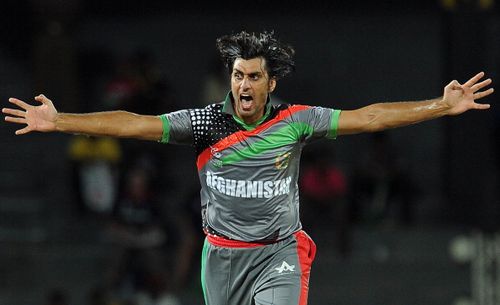
Minnows are mean now
New members of international cricket are feeling exceedingly insulted by the ‘minnows’ tag. The author, Debojit Dutta thinks it’s all part of ICC’s evil plan to never let its kids grow.

We better listen when Johnston speaks. (Photo: Getty Images)
With the group stages of the World T20 coming to closure today, and with all four weakest teams having packed their bags after Pakistan’s thumping victory over Bangladesh, we will see eight of cricket’s proverbial heavyweights, each with equal chance of winning, battle it out for the trophy.
All these eight teams have at least one major tournament victory under their belt and have oodles of experience to claim seniority — Sri Lanka, the youngest of them, played their first international match three-and-a-half decades ago. So the vast gap between the two worlds gets pretty much established here.
Still Irish pacer, a member of the minority, Trent Johnston is furious. They all are like this. But when someone with Johnston’s built talks we better listen.
All Clint Eastwood stare, arms akimbo, menacingly bald and if one believes an image published in the ESPNcricinfo, he is Arnab Goswami-like mad at us for calling him a minnow: “Do I look like a small, insignificant fish?”
After notable performances in each of the two T20 and ODI World Cups Ireland have participated in, the bowler believes he has earned the right to shout at us.
Ireland have twice gone beyond the initial phases of the tournaments and missed out on two other occasions by sheer bad luck: due to a rain-interrupted game against England in the World T20 two years ago, and this year thanks to rain again, denying them to bowl even a single ball against West Indies — who galloped past them on net run-rate, without winning any game. In the course of last five years in those major tournaments, they have forced huge upsets — defeating Pakistan and Bangladesh, and completing a record chase of 329 runs against England in the last ODI World Cup.
The world watched in awe. It was lip-smacking. It always is. This fabled tale of the Davids triumphing over the Goliaths. But here in cricket, fables stretch too far for the protagonists’ liking. Zimbabweans, who have been playing international cricket since the ’83 World Cup, are still inducing awe. Bangladesh, who have constantly been increasing expectations against major teams since the past few years, are still touched with some arrogance by the greater teams. As a matter of fact, Bangladesh’s record against West Indies reads: two wins and two draws in eight Test matches, and two wins in three T20 internationals.
“They’re Full Member countries (Bangladesh and Zimbabwe) and they’ve been called minnows in this World Cup (World T20) and personally I’m just sick and tired of it,” said Johnston.
It is difficult to understand the mechanism used here. While on one hand, the International Cricket Council (ICC) talks of promoting cricket in the associate nations through building a sense of inclusiveness, its tendency to lure and then not let them eat the cake reeks of hypocrisy.
Take for instance this ongoing tournament for which teams like Afghanistan and Ireland have come through the rigours of qualifiers. Unlike the Full Member countries that get selected automatically, the associates earn their spot in every major tournament. But for what?
Shamya Dasgupta makes a notable observation about this year’s WorldT20 in Wisden India. “It gets worse when you realise that Zimbabwe and Afghanistan, poorer than Bangladesh and Ireland, were not even given a fair deal,” he points out, “they played both their matches and went home before West Indies or Pakistan – two of the pre-tournament favourites – got to play their first games.”
Worse still, that both Afghanistan and Zimbabwe were clubbed in groups from which they hardly had any chance of progressing.
While it is understandable that there is pressure from the organisers and broadcasters to make the tournament commercially viable, drafting upcoming teams for the sake of it doesn’t do anyone any good.
People who had been following cricket in the last decade would know that Kenya used to be a fine side once, constantly punching above their weights. They had made it to the semi-finals of the 2003 World Cup by no fluke but after that everything fell apart. It had a lot to do with player disputes and poor administration, but that wasn’t all.

A decade ago, Kenya was a fast-improving side.
Kenya’s Word Cup performance was rewarded with their inclusion in a quadrangular tournament in Sharjah, featuring Zimbabwe, Sri Lanka and Pakistan. But in the three years succeeding that, they got just two internationals to play, both in the ICC Champions Trophy 2004.
Similar fate looks ominous for Ireland with no international team, apart from England and Australia, willing to play them apart from in major tournaments.
The big teams, Johnstson says, “can’t play us because they’ve got programmes left, right and centre and IPL, BPL and Big Bash, blah, blah…” and Bangladesh and Zimbabwe, he swears he knows, are simply “scared” of getting beaten and losing their ranking.
The ICC having totally given up control over the scheduling of events and in an age when teams and players freely pick leagues over international matches, it is no surprise that no one wants to waste their time and money playing matches for charity. And no blaming the players, they are in your face about it!
It gets farcical only when certain advocates and organisers of the T20 leagues want us to believe that these leagues are meant to globalise the game and nurture talent across countries.
This holds true for only the host nations. With Bangladesh Premier League (BPL) around, youngsters from Bangladesh will surely benefit from the exposure but the other nations, more fragile — both talent-wise and financially — will neither reap lucre nor earn public glare.
This ignorance is frustrating and shows up too often. Many Irish players have given up playing for their nation of birth for better future with England. Eoin Morgan, Ed Joyce (who later backtracked after not much luck in England) and Boyd Rankin, who was part of the Irish playing eleven in the World T20, have been lost to the big brother. It’s almost like playing county cricket, grabbing eyeballs and then taking the next leap to meet career ambitions. But they are hardly at fault. Only lunatics, artists and poets choose to live in darkness when there’s party in the next room.

Shapoor Zadran – Pace, swing, but no international cricket
Afghanistan’s performance in their two matches in this tournament was contrasting. Although sloppy while fielding on both occasions, their batting on occasion and especially their bowling, impressed the experts and viewers. Players like Shapoor Zadran gave out their heart in what were actually nominal games. With genuine pace and accuracy, he troubled established batsmen from former champions of the tournament. But with a hiatus of three years to follow before 2015 World Cup, he may just be given to oblivion.
Come 2015, we will again hear tales of their past as refugees in a war-torn country, of poverty, bullets and guns. We will read books, watch documentaries. Listen, even, to what Taliban has to say about cricket in its state. We will sympathise with them and merrily forget that inside the boundaries they were cricketers, and this was the only thing that mattered to them and the only detail we missed.